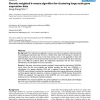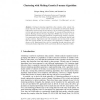140
click to vote
PAMI
2006
15 years 2 months ago
2006
The k-means algorithm is widely used for clustering because of its computational efficiency. Given n points in d-dimensional space and the number of desired clusters k, k-means see...
116
click to vote
BMCBI
2008
15 years 2 months ago
2008
Background: The traditional (unweighted) k-means is one of the most popular clustering methods for analyzing gene expression data. However, it suffers three major shortcomings. It...
139
click to vote
NIPS
1994
15 years 3 months ago
1994
This paper studies the convergence properties of the well known K-Means clustering algorithm. The K-Means algorithm can be described either as a gradient descent algorithmor by sl...
130
click to vote
CIMCA
2008
IEEE
15 years 4 months ago
2008
IEEE
This paper analyses the advantages and disadvantages of the K-means algorithm and the DENCLUE algorithm. In order to realise the automation of clustering analysis and eliminate hu...
156
click to vote
CSIE
2009
IEEE
15 years 6 months ago
2009
IEEE
K-means algorithm is one of the most famous unsupervised clustering algorithms. Many theoretical improvements for the performance of original algorithms have been put forward, whi...
119
click to vote
ICDM
2002
IEEE
15 years 7 months ago
2002
IEEE
The k-means algorithm with cosine similarity, also known as the spherical k-means algorithm, is a popular method for clustering document collections. However, spherical k-means ca...
111
click to vote
GECCO
2004
Springer
15 years 7 months ago
2004
Springer
GA-based clustering algorithms often employ either simple GA, steady state GA or their variants and fail to consistently and efficiently identify high quality solutions (best known...
106
click to vote
ICALP
2005
Springer
15 years 7 months ago
2005
Springer
Abstract. We generalize the k-means algorithm presented by the authors [14] and show that the resulting algorithm can solve a larger class of clustering problems that satisfy certa...
ICDM
2006
IEEE
15 years 8 months ago
2006
IEEE
The k-means algorithm is a popular clustering method used in many different fields of computer science, such as data mining, machine learning and information retrieval. However, ...
120
click to vote
ICDM
2007
IEEE
15 years 8 months ago
2007
IEEE
This paper proposes an optimisation to the UK-means algorithm, which generalises the k-means algorithm to handle objects whose locations are uncertain. The location of each object...


